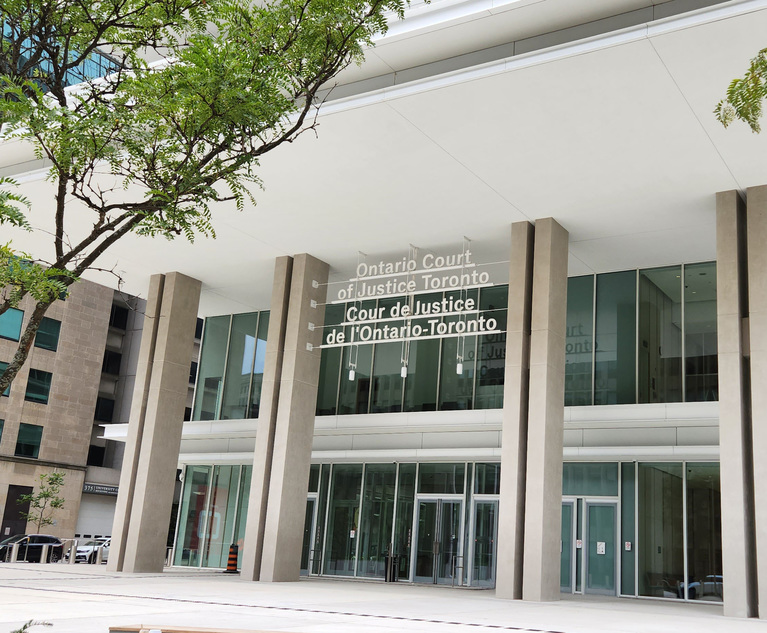It could have become a controversial appointment in many countries, one that might have drawn criticisms about impartiality, similar to the ones that followed Fiona Scott Morton’s appointment as the EU’s chief economist this summer after it emerged that she had advised several tech giants as a consultant.
But in the Netherlands, no one appears to have batted an eyelid when a competition lawyer who had spent his entire career at the prestigious local firm De Brauw Blackstone Westbroek, including six years as managing partner, was named as the new head of the Dutch competition authority in 2018.
In fact, it almost seemed like a prerequisite for the job of chairman of the Netherlands Authority for Consumers and Markets. Chris Fonteijn, the only other person to have served in his role, practiced at NautaDutilh, another leading Dutch firm, for 25 years.
In an exclusive interview with Law.com International, Martijn Snoep said that during his 28 years as a private practitioner—during which he advised on the largest takeover in Dutch history of ABN Amro by three other banks—he had championed the need for an independent competition watchdog, and had been a strong supporter of its merger with the country’s consumer protection agency and its postal and telecoms authority in 2013.
“My involvement in the public policy side of competition policy did not come as a surprise to many,” he said when asked about the absence of grumblings about his appointment. “Maybe that has helped.” (According to Snoep, he had a “very international practice” as an antitrust partner and has had to recuse himself from a few cases over conflicts of interests since 2018.)
From Amsterdam, Snoep leads an agency of 650 people whose broad remit makes it unique in Europe: It also serves as the country’s telecommunications, transport, postal services, healthcare and energy watchdog in addition to carrying out its competition watchdog mandate.
Snoep says the ACM’s multipronged role has meant that competition concerns course through their enforcement work, no matter the industry at stake. “Competition is in our DNA at the agency. So, we tend to look at markets from a competitive point of view, and when we’re using our regulatory powers,” he said, noting the agency’s competition enforcement is also “very much consumer-focused.”
The ACM’s multiple regulator roles has meant that companies that submit information about their activities as part of merger proceedings to its competition wing should fully expect that information to be shared with its other departments. “If there is a merger filing with us and the filing also provides evidence that consumer protection laws are being violated, then of course we can pass that information on to our consumer protection colleagues and they can take action,” Snoep said.
Top of mind for Snoep at the moment are competition concerns that arise not from behavior that clearly violates the country’s competition laws but from what he described as “the structure of the market or legal behavior by companies.” He cited the current, low interest rates on consumer savings accounts as an example. “There’s no indication that there is a cartel, there’s no indication that there is an abuse of dominance. But the market does not seem as competitive as we would like it to be.”
It’s why Snoep has been pleading for a New Competition Tool, comparing it to the Competition Tool proposed by Brussels officials a few years ago—one they withdrew in favor of the Digital Markets Act.
Snoep and his colleagues will be putting forward this request in future talks with leaders of the political parties that won last week’s general election. (Observers are expecting the Dutch government formation to be a difficult and long process after the unexpected election triumph of the anti-Islam PVV party). He sees it as a next-generation tool for the competition problems that enforcers are not able to address with their current toolbox, and notes that the U.K., Germany and Norway already have such a tool, while Germany is also pushing for one.
“What we would like to have is a tool where we can … not impose a fine, not punish companies, but impose remedies to make these markets work again,” he said, citing transparency obligations and interoperability obligations as examples of non-punitive measures.
Under Snoep’s stewardship, the Netherlands has become one of just a handful EU countries to follow the example of the U.K. and its Digital Markets Unit by setting up a body that groups all the regulators overseeing digital regulation in 2021. This Digital Regulation Cooperation Platform brings together the Dutch Authority for the Financial Markets, the Dutch Data Protection Authority, and the Dutch Media Authority in addition to the ACM, and officials at the most senior level, the mid-level and lower level of the four agencies regularly meet to discuss digital enforcement. It was founded with the aim, Snoep said, of combatting the “tribalization” that can manifest itself in every organization, for instance, between those responsible for privacy on the one hand and those responsible for competition on the other.
“The slightest difference of opinion or friction between the agencies will immediately be used by the companies that we are trying to regulate and they will amplify it and make it bigger than it actually is [and] frustrate enforcement,” he said. “It’s like in a family—if the parents argue with each other, it’s happy times for the kids.”
Since taking office, the ACM chairman has advanced a pragmatic attitude when it comes to a policy tension that regulators across the EU have been wrangling with—namely, how and to what extent to allow competitors to work together to achieve sustainability goals while also making sure those collaborations don’t reduce competition or lead to cartels. During a recent speech he gave at a conference in Brussels, Snoep made clear where he stood, saying “Short-term restrictions of competition are necessary to make this transition [towards a sustainable economy] work”.
In the interview with Law.com International, Snoep insisted he was not calling for a law change but simply for a better reading of the EU’s founding 1957 treaty and the key provision—Article 101.3—which permits cartels when their benefits outweigh their negatives. “I’m going back to the rules, how they were designed at the time,” he said. “The law obviously wasn’t written at a time when there was this discussion about sustainability agreements. Nevertheless, they had other ideas and societal issues at the time that allowed, under certain conditions, for anti-competitive agreements to be unfettered by the competition laws.”
Perhaps it’s because of his previous private-practice career that Snoep fully acknowledges there is a “category of competition violations” where the line between lawful and unlawful behavior isn’t always clear, as lawyers recently warned about recently released enforcement guidance from the European Commission.
As an example of such a “grey zone,” he pointed to the agency’s recent decision to order tech giant Apple to ensure its app store provides alternative forms of payment to its own payment system for dating apps in the Netherlands.
“Lots of people thought: Okay, this is not an infringement of competition law. And we said: It is. But instead of imposing a fine, we told Apple to change their behavior going forward,” he said. “That is an important instrument that we can use for those cases where it’s not crystal-clear that there is a violation and where punishment is probably not the right instrument.”
The ACM has, however, issued €50 million in fines to Apple for dragging its feet on complying with its 2021 order. Apple is currently challenging the fines before a Rotterdam court.









